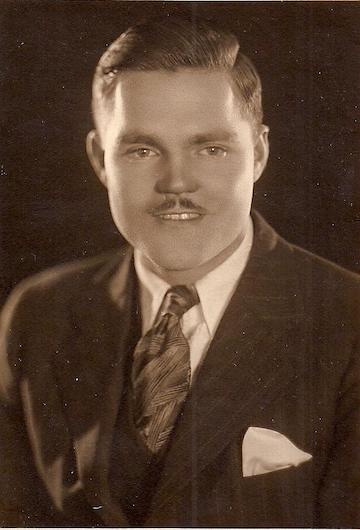Wallace F. Toronto
Wallace F. Toronto was the longest serving mission president in the history of The Church of Jesus Christ of Latter-day Saints, having served for 32 years over the Czech Mission.
Toronto was born on December 9, 1907, in Salt Lake City, Utah. As a young man, he was called to labor in the German mission (October 1928). In June 1929 he was among the first elders transferred to open the Czechoslovak Mission under mission president Arthur Gaeth.
After his mission concluded, he returned to Utah and married Martha Sharp on September 15, 1933. He also studied at the University of Utah.
In 1936, Wallace was called to preside over the Czech Mission. His 24-year-old wife was called to serve with him and they brought their one-year old daughter to their mission. Their second child was born five months after their arrival.
Eighty-one-year-old Church president Heber J. Grant came to visit the mission in 1937, which boosted missionary work there, but within a year, missionary work declined due to the presence of Adolf Hitler.[1] Part of Czechoslovakia was taken in the Munich Agreement in September and the Czechs began to struggle under Germany’s undeclared war on their country.
Martha and the children went to Switzerland, older missionaries were sent also to Switzerland or home, and the mission was closed. By December 1938 when it looked like it was safe, Martha and their children returned to Czechoslovakia. By March 15, 1939, the Nazis occupied Czechoslovakia. Wallace and Martha had their third child.
In July the Gestapo arrested four missionaries. They lived on bread and water for forty days until President Toronto was able to negotiate their release.
By August 24, 1939, the American Embassy and President Grant ordered the evacuation of all American Latter-day Saint missionaries. Toronto sent most of them to Denmark, including his wife and children. He stayed in Czechoslovakia to finish getting his missionaries out safely. They arrived hours before the outbreak of World War II.
Back in Utah, Toronto became the director of the Utah Red Cross. He continued to serve as president of the Czechoslovak Mission and had set apart 21-year-old Josef Roubícek to preside in his absence. Toronto earned his MA degree in sociology from the University of Utah.
Elder Ezra Taft Benson, then of the Quorum of the Twelve Apostles, went to Czechoslovakia in March 1946. “He was pleased to find the Czech people cheerfully at work. The Church had been as resilient as the country. Ten baptisms had been performed during the war. When Elder Benson inquired at government offices about reopening the mission, he discovered that the Church had an excellent reputation and would be welcomed back.”[2]
On June 28, 1946, Toronto and two additional missionaries returned to the country. “In the spring of 1947, a year after his arrival in Czechoslovakia, President Toronto obtained suitable quarters for his family and rented a four-story villa to serve as the mission home. By October 1948 a steady stream of missionaries swelled the total proselyting force to thirty-nine.”[3]
Free Czechoslavia ceased to exist in February 1948 after a Communist coup. Missionaries were restricted by 1949 and by 1950, missionaries were expelled from the country and a Czech governmental decree liquidated the mission on April 6, 1950. The registration of the Church was cancelled. Czech members were not allowed to gather.
Toronto was not released from his calling as president of the Czech mission. Over the course of the following fifteen years, he applied for a Czech visa nine times and was refused each time. He kept in touch with the members through letters and in 1964, Church president David O. McKay assigned the Torontos to visit the Czech Saints as tourists and they finally received visas.
“In July 1965 President Toronto returned to Prague alone, intent on reestablishing the Church. Although he was well received by many governmental officials, his prominence had attracted the attention of the secret police, who arrested him. To his surprise, President Toronto was interrogated by the very man he had hoped to see. He presented his case. In answer, he was escorted to the German border—evicted from the country.”[4]
He remained president of the Czech Mission until his death from cancer on January 10, 1968, in Salt Lake City.
In addition to his service as mission president, Toronto taught seminary, served on the general board of the Young Men’s Mutual Improvement Association, and became the executive secretary of the Utah Cancer Society.
